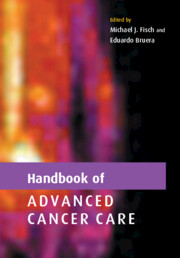Book contents
- Frontmatter
- Contents
- List of contributors
- Preface
- Acknowledgements
- PART I General concepts in oncology
- Part II Primary tumors
- 17 Lung cancer
- 18 Breast cancer
- 19 Colorectal cancer
- 20 Prostate cancer
- 21 Pancreatic and hepatobiliary cancer
- 22 Anal cancer
- 23 Esophageal and gastric cancer
- 24 Head and neck cancer
- 25 Kidney cancer
- 26 Bladder cancer
- 27 Ovarian cancer
- 28 Gynecologic malignancies: endometrial and cervical carcinoma
- 29 Testicular cancer
- 30 Unknown primary site cancer
- 31 Mesothelioma
- 32 Adult soft tissue sarcoma
- 33 Osteosarcoma and Ewing's sarcoma
- 34 Melanoma
- 35 Primary brain tumors
- 36 Thyroid and adrenal cancer
- 37 HIV-related cancer
- 38 Hodgkin's and non-Hodgkin's lymphoma
- 39 Leukemia, myelodysplastic syndrome and myeloproliferative disorder
- 40 Multiple myeloma
- Part III Management of specific symptoms and syndromes
- Index
- References
37 - HIV-related cancer
Published online by Cambridge University Press: 04 August 2010
- Frontmatter
- Contents
- List of contributors
- Preface
- Acknowledgements
- PART I General concepts in oncology
- Part II Primary tumors
- 17 Lung cancer
- 18 Breast cancer
- 19 Colorectal cancer
- 20 Prostate cancer
- 21 Pancreatic and hepatobiliary cancer
- 22 Anal cancer
- 23 Esophageal and gastric cancer
- 24 Head and neck cancer
- 25 Kidney cancer
- 26 Bladder cancer
- 27 Ovarian cancer
- 28 Gynecologic malignancies: endometrial and cervical carcinoma
- 29 Testicular cancer
- 30 Unknown primary site cancer
- 31 Mesothelioma
- 32 Adult soft tissue sarcoma
- 33 Osteosarcoma and Ewing's sarcoma
- 34 Melanoma
- 35 Primary brain tumors
- 36 Thyroid and adrenal cancer
- 37 HIV-related cancer
- 38 Hodgkin's and non-Hodgkin's lymphoma
- 39 Leukemia, myelodysplastic syndrome and myeloproliferative disorder
- 40 Multiple myeloma
- Part III Management of specific symptoms and syndromes
- Index
- References
Summary
There were estimated to be 422 000 persons with HIV/AIDS in the US in the year 2000. Over the past 20 years, acquired immunodeficiency syndrome (AIDS) has changed from a rapidly fatal disease to a controllable, chronic disease. Among people with HIV-positive status, the presence of CD4 T-cell counts ≤ 400 and the codiagnosis of any one of three cancers upgrade the diagnosis to AIDS. These cancers are Kaposi's sarcoma, non-Hodgkin's lymphoma, and invasive cancer of the uterine cervix. This chapter will address information on these cancers as they relate to AIDS patients including the complexities of managing two coexisting serious diseases. There are issues related to the need for numerous anti-AIDS drugs as well as prophylactic antibiotics and potential drug–drug interactions when adding chemotherapy or radiation therapy. AIDS patients are at risk for opportunistic infections and chemotherapy drugs also increase the risk of infection, both by lowering the white cell count and sometimes by direct suppression of the immune system.
In the early 1980s, medical researchers described a new syndrome associated with opportunistic infections, lymphadenopathy, primary brain lymphoma, and Kaposi's sarcoma. The infections include oral esophageal and pulmonary candidiasis, pneumocystis carinii, extrapulmonary cryptococcosis, cryptosporidiosis-induced diarrhea, cytomegalovirus of nonreticuloendothelial organs, prolonged herpes simplex infections of the mouth, esophagus or bronchi, or multiple bacterial infections during a 1-year period. The human immunodeficiency virus (HIV) was isolated in 1983 and is known to infect T lymphocytes called helper cells. Initially homosexual men predominated the affected population.
- Type
- Chapter
- Information
- Handbook of Advanced Cancer Care , pp. 300 - 307Publisher: Cambridge University PressPrint publication year: 2003



